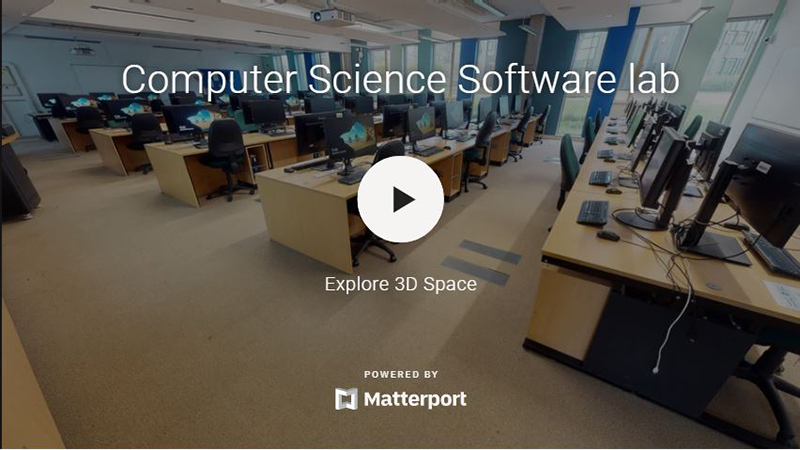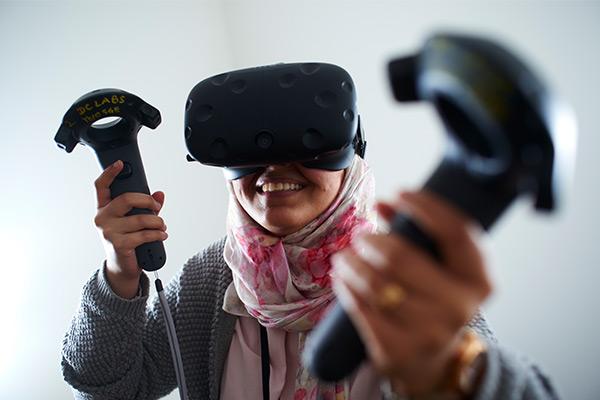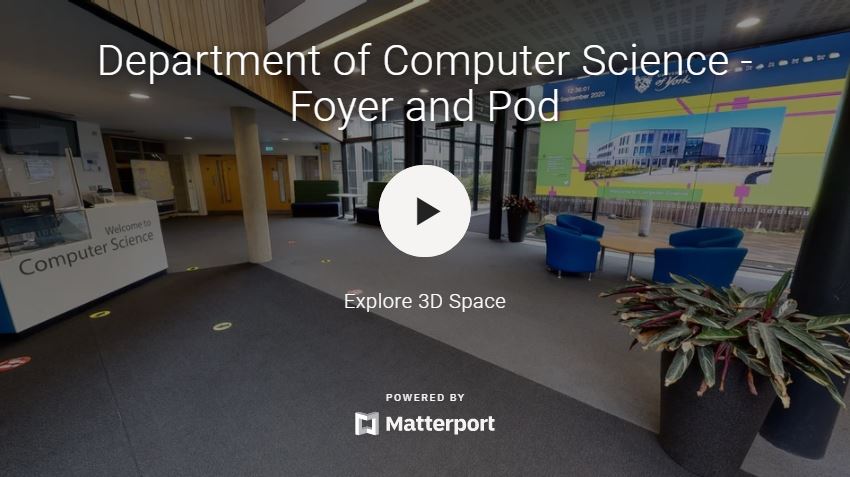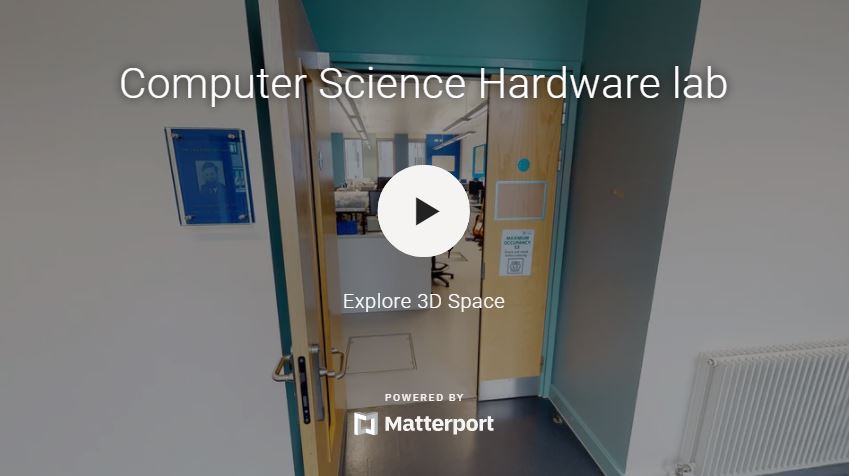View semester dates

MEng (Hons) Computer Science with Cyber Security
Become a warrior in the fight to ensure people and systems are kept safe online
Year of entry: 2026/27
View semester dates
Cyber security covers concepts, policies, guidelines, tools and technologies used to protect the cyber environment, organisational assets and users.
Our integrated Masters helps you develop as a multi-skilled, highly competent practitioner. The course provides a solid foundation in computer science and cyber security, including coding, mathematics and basic engineering.
You will then undertake advanced training, informed by our world-class research, in topics such as secure systems, cryptography and forensic analysis, gaining a solid theoretical foundation to take full advantage of emerging new technologies.
On graduating, you’ll be prepared for a career in cyber security or related fields across industry and government.
This course is also available as a five-year course with the same content but an additional year in industry. See MEng in Computer Science with Cyber Security (with a year in industry).
Accreditation
This course is accredited by:
- BCS, the Chartered Institute for IT for the purposes of fully meeting the academic requirement for registration as a Chartered IT Professional.
- BCS, The Chartered Institute for IT on behalf of the Engineering Council for the purposes of fully meeting the academic requirement for registration as a Chartered Engineer.
Find out more about what this professional accreditation means.
Our software labs offer spaces for individual and group work. Software lab virtual tour

The balance and diversity on the course helps build a strong foundation while allowing us to explore various career paths. Moreover, York provides the option to specialize in a specific field, which is very appealing.
Course content
All students will study our core topics in computer science, which we have designed to be consistent with the Association for Computing Machinery (ACM) curriculum guidelines. These core topics provide the fundamental knowledge that all computer science graduates should possess, and the foundation required to specialise in the third and fourth years. The core topics are structured into eight streams:
- Theory
- Software
- Systems and Devices
- Data
- Human-Computer Interaction (HCI)
- Intelligent Systems
- Engineering
- Cyber security
At least 25% of the course content will be in your specialist area of cyber security. To recognise this, your degree title will reflect your specialism.
Year 1
In Year 1, you'll focus on establishing a solid foundation regardless of your previous experience of programming and computing.
Core modules
- Software 1: Foundations of Programming for Computer Science
- Theory 1: Mathematical Foundations of Computer Science
- Human-Computer Interaction
- Software 2: Object-Oriented Data Structures and Algorithms
- Systems and Devices 1: Introduction to Computer Architectures
- Theory 2: Formal Languages and Automata
Academic integrity module
In addition to the above you will also need to complete our online Academic Integrity module.
Year 2
Year 2 of the course will build upon the solid foundations you've laid down in Year 1. You’ll take modules from streams 1 to 5 to deepen your learning, start on two further streams studying intelligent systems and undertake a group engineering project. You should develop your interests which you will then begin to focus on in Year 3.
Core modules
Year 3
In Year 3, you'll really get under the skin of the specialist areas which interest you.
Most Cyber Security and option modules are open to third and fourth year students subject to meeting module prerequisites. When you take option modules in Year 4, you will need an additional assessment to reach Masters Level (M-Level). This may, for example, be an extra exam question with stricter marking criteria.
Core modules
As well as your individual project on a Cyber Security related topic you will take at least two Cyber Security designated optional modules, examples can be found below:
Option modules
You will study one or two option modules depending on how many Cyber Security designated modules you choose. Examples can be found below. Some option module combinations may not be possible. The options available to you will be confirmed after you begin your course.
- AI Search and Logic
- Autonomous Robots
- Computer Vision and Graphics
- Embedded Systems Design and Implementation
- Engineering 2: Automated Software Engineering
- Evolutionary Intelligence
- High-Integrity Systems Engineering
- High-Performance Parallel and Distributed Systems
- Human Factors: Technology in Context
- Deep Learning
- Legal Practice, Technology and Computer Science
- Player Experiences in Digital Games
- Qualitative Approaches to Investigating UX
- Quantum Computation
- Research Methods in Computer Science
Elective modules
You may be able to replace one option module with an elective module, studying a complementary subject, a language or an interdisciplinary topic.
Year 4
In Year 4, you'll choose between a group engineering project or an individual advanced research project. You’ll also take modules which access departmental research at an advanced level.
Most Cyber Security and option modules are open to both third and fourth year students subject to meeting module prerequisites. When you take option modules in Year 4, you will need an additional assessment to reach Masters Level (M-Level). This may, for example, be an extra exam question with stricter marking criteria.
Core module
As well as your project you will take at least one Cyber Security designated optional module (you can't take a module at M Level in Year 4 that you have already completed at H Level in Year 3). Examples can be found below:
Option modules
You will study two or three option modules depending on how many Cyber Security designated modules you choose (you can't take a module at M Level in Year 4 that you have already completed at H Level in Year 3). Examples can be found below. Some option module combinations may not be possible. The options available to you will be confirmed after you begin your course.
- AI Problem Solving with Search and Logic
- Autonomous Robotic Systems Engineering
- Computer Vision and Graphics
- Embedded Systems Design and Implementation
- Engineering 2: Automated Software Engineering
- Evolutionary and Adaptive Computing
- High-Integrity Systems Engineering
- High-Performance Parallel and Distributed Systems
- Human Factors: Technology in Context
- Intelligent Systems: Probabilistic and Deep Learning
- Player Experiences in Digital Games
- Qualitative Approaches to Investigating UX
- Quantum Computation
- Research Methods in Computer Science
Elective modules
You may be able to replace one option module with an elective module, studying a complementary subject, a language or an interdisciplinary topic.
Our modules may change to reflect the latest academic thinking and expertise of our staff, and in line with Department/School academic planning.
Learning outcomes
Every course at York has been designed to provide clear and ambitious learning outcomes. These learning outcomes give you an understanding of what you will be able to do at the end of the course. We develop each course by designing modules that grow your abilities towards the learning outcomes and help you to explain what you can offer to employers. Find out more about our approach to teaching and learning.
Learning outcomes for this course
- Apply computational thinking to problems they encounter, using skills in problem analysis, representation and abstraction, and in algorithm selection, at different scales in complex situations, and drawing on the foundations of computer science.
- Adapt to new technologies, languages, paradigms, terminologies and models as they become available, being confident to use advanced techniques and tools in their practice.
- Design and build computer-based systems to serve the needs of users, with the most appropriate combination of software and hardware, by applying the theory and practice of programming, software engineering and cyber security, while making effective use of the variety of physical implementations on which that software may be running.
- Engineer solutions to problems by using skills from the whole breadth of Computer Science across all parts of the development lifecycle, with particular focus on cyber security.
- Make immediate and effective contributions as part of multidisciplinary teams in industry, consultancy or education, by managing workloads, optimising resources and meeting deadlines, using experiences from team projects.
- Communicate with technical and non-technical stakeholders about complex computational problems and their solutions in a clear and organised manner.
- Operate as responsible Computer Science professionals by maintaining awareness of key legal and ethical issues, appreciating how computers and technology can impact on society, how society is impacted by a need for secure computing systems, and by continuing to expand and deepen their knowledge through critical engagement with the discipline.
- Apply theoretical and practical knowledge of cutting-edge cyber security research to new or unfamiliar problems they encounter in employment or further study, and to communicate the results in a significant technical report or other appropriate medium.
Fees and funding
The fees and funding information here is for students starting in the 2026/27 academic year.
If you take a year abroad or year in industry you'll pay a reduced rate of fees for that year.
Annual tuition fees
| UK (home) | International and EU |
|---|---|
| £9,535 (TBC) | £32,350 |
The UK government has announced its intention to increase tuition fees from £9,535 to £9,790 for the 2026/27 academic year. We expect this to apply to new UK (home) undergraduate students starting their studies in September 2026.
UK (home) or international fees?
The level of fee that you will be asked to pay depends on whether you're classed as a UK (home) or international student. Check your fee status.
Fees for subsequent years
- UK (home) fees may increase within the government fee cap in subsequent academic years. We will notify you of any increase as soon as we can.
- International fees are subject to increase in subsequent years in line with the prevailing Consumer Price Index (CPI) inflation rate (up to a maximum of 10%).
More information
For more information about tuition fees, any reduced fees for study abroad and work placement years, scholarships, tuition fee loans, maintenance loans and living costs see undergraduate fees and funding.
Additional costs
There are unlikely to be any mandatory additional costs associated with the course, although you may want to set aside £200 for optional photocopying and personal stationery over the duration of the course.
Funding
We'll confirm more funding opportunities for students joining us in 2026/27 throughout the year.
- UK government loans
- UK scholarships and bursaries
- International scholarships
- Country-specific funding
- US loans
See undergraduate scholarships for current information about funding opportunities for Computer Science students.

The placement team were incredibly helpful. They encouraged us to submit drafts of our CV for feedback. There were also sessions on topics like imposter syndrome and interview skills. These were open to everyone, not just those on the year in industry route, making them a great resource for all students.
York, Oxford, Cambridge, Imperial
Just four UK universities are rated Gold for teaching and top ten for research* in the latest national assessment exercises.
* Awarded joint 10th in the Times Higher Education ranking of the Research Excellence Framework 2021.
Teaching and assessment
You’ll study and learn with academics who are active researchers, experts in their field and have a passion for their subjects. Our approach to teaching will provide you with the knowledge, opportunities, and support you need to grow and succeed in a global workplace. Find out more about our approach to teaching and learning.
Teaching format
A typical week will involve about 10-15 hours of scheduled teaching time. Our courses are based on a series of lectures with associated laboratory sessions, programming classes and tutorials.
Throughout the course, you will have a personal supervisor responsible for guiding your studies. In addition to any timetabled sessions, you will meet with your supervisor regularly, and you can also go to them at any time should you have any issues, academic or personal. There are problem classes to help you put learning from lectures into practice and regular project supervision meetings for your individual project.
You will also undertake learning outside of the scheduled timetable. This can be through working in the labs, through reading recommended materials or by working through problems. Consequently, you'll need to be self-motivated, self-disciplined and willing to learn outside regular classes.
As you progress through the course you will develop your skills to become a more independent learner. You'll also spend time working on your individual research project later on in the course, in addition to timetabled activity.
Timetabled activities
In your first year, you can expect:
| Lectures | 4-6 hours per week |
|---|---|
| Tutorials | 0-2 hours per week |
| Problem classes | 2-4 hours per week |
| Practicals | 3-6 hours per week |
| Optional activities | 0-3 hours per week |
These figures are representative of a typical week. Your contact hours will vary throughout the year due to your module choices, non-compulsory classes, exam periods and changes to scheduled activities.
Outside your timetabled hours, you'll study independently. This may include preparation for classes, follow-up work, wider reading, practice completion of assessment tasks, or revision.
In the UK, full-time students are expected to spend 1,200 hours a year learning. That's about 40 hours of classes and independent study each week during semesters. Everyone learns at a different rate, so the number of hours you spend on independent study will be different to other students on your course.
Facilities
We have four software and two hardware laboratories which you will be able to use depending on the topic of your final year project. These facilities are professional grade and used by our research teams so, depending on your interests, you'll get first hand exposure to these environments.
Our study and social pod is open 24/7 for group and individual study. It can also be booked for student society meetings and for events.
Find out more about our facilities, including a video tour showing our labs, teaching and research spaces.
Teaching location
The Department of Computer Science is based on Campus East in the Ian Wand Building. The majority of your teaching will take place in the Ian Wand Building, with additional teaching taking place at other locations on Campus East.
About our campus
Our beautiful green campus offers a student-friendly setting in which to live and study, within easy reach of the action in the city centre. It's easy to get around - everything is within walking or pedalling distance, or you can use the fast and frequent bus service. Take a campus tour.
Assessment and feedback
We use a variety of assessment techniques throughout your course. This allows you to practice different techniques, from report writing, presentations and live demos to timed programming assessments and closed exams. It also means that you are not disadvantaged by being assessed in any one way.
To aid your learning we provide feedback on your assessments in addition to the marks you receive. Our Departmental Examinations Team is also available should you have any assessment queries.
We also ask our students for feedback on the course at the end of each year. This helps to improve and modify what we do to help meet the needs of our students.
Careers and skills
The move towards a digital economy creates demand for computer scientists and software engineers across a broad section of employers, so the skills you develop here will make you attractive to many organisations. Most of our graduates go into the field of IT/computing, followed by financial services, some undertake further study (eg PhD) and others go straight into industry (for example working for IBM, BAE Systems).
Many of our graduates are employed by software and electronics industries, but the continuing expansion of the use of computers in commercial and financial operations means that you will be able to find employment in other industries - and here your sharpened numeracy and analytical skills will have prepared you well.
Read some profiles of our past students and find out how their degree from York helps them to do jobs in organisations as diverse as Mars Inc and Cancer Research UK. Other companies that York graduates have gone on to work for include Amazon, BAE Systems, Morgan Stanley, G Research, Thales, the Civil Service, M&G Investments, Ubisoft, Rapita Systems, Sky, BT, Raspberry Pi, IBM, JP Morgan, Hut Group and Automaton Games.
Career opportunities
- Computer programmer
- Software engineer
- Software developer
- Business analyst
- Research scientist
- Network manager
- IT Systems manager
Transferable skills
At York, you will gain a broad understanding of all of the essential scientific principles, engineering techniques and practices in computer science. This allows you to be flexible and adapt quickly in any field that you wish to go into. More specifically, we can identify four main skill areas:
- analytical skills
- research skills
- management skills
- communication skills
Entry requirements
| Qualification | Typical offer |
|---|---|
| A levels | A*AA including Mathematics. If you are studying towards a fourth A level, we will make an alternative offer of AAAA including Mathematics. |
| Access to Higher Education Diploma | We accept the Access to Higher Education Diploma. The syllabus must contain a significant portion of Mathematics that is considered equivalent to A level standard. Applications will be considered on an individual basis - please contact the Department before you apply. |
| BTEC National Extended Diploma | DDD and grade B in A level Mathematics (or equivalent qualification). We consider applicants with a combination of other BTEC Level 3 qualifications, and this must include an A level in Mathematics at grade B or above (or equivalent qualification). Please contact us to discuss your combination of qualifications. |
| European Baccalaureate | 87% overall, including 85% in Mathematics |
| International Baccalaureate | 37 points overall, including 5 in Higher Level Mathematics (either Analysis and Approaches or Applications and Interpretations), or 6 in Standard Level Mathematics (Analysis and Approaches). |
| T levels | We are currently not accepting T Levels for this course unless an additional A Level (or equivalent qualification) in Mathematics has been taken. |
| Scottish Highers / Advanced Highers | Advanced Highers - A in Mathematics plus Scottish Highers - ABBB We may also be able to consider three Advanced Highers or a combination of Highers and Advanced Highers, where an applicant does not meet the grade requirement through Highers alone. Please contact us to discuss your qualifications. |
| International foundation programme | Foundation Certificate from our International Pathway College or an appropriate alternative. |
| Other qualifications | We welcome applications offering a mix of OU, A level and other appropriate qualifications. Applications will be considered on an individual basis: please contact the Department before you apply. |
| Other international qualifications | Equivalent qualifications from your country |
Alternative offers
Meeting the following additional criteria may qualify you for an alternative offer.
| Criteria | Adjustment |
|---|---|
| Widening participation | ABB including Mathematics This is conditional upon successful completion of the WP programme including the YorJourney module (Black Access Programme, Next Step York) or successful completion of Realising Opportunities More about widening participation. |
| Contextual offer | AAB including Mathematics. |
| EPQ | If you achieve A or higher in the EPQ, you may be eligible for an alternative offer up to one A level grade (or equivalent) below our typical offer. |
English language
If English isn't your first language you may need to provide evidence of your English language ability. We accept the following qualifications:
| Qualification | Minimum requirement |
|---|---|
| IELTS (Academic) | 6.5, with a minimum of 6.0 in each component |
| IB English | A score of 4 in English A or 5 in English B (Higher Level or Standard Level) |
| Cambridge CEFR | 176, with a minimum of 169 in each component |
| Oxford ELLT | 7, with a minimum of 6 in each component |
| Oxford Test of English Advanced | 136, with a minimum of 126 in each component |
| Duolingo | Integrated subscores: 120 overall, with a minimum of 105 in each component |
| GCSE/IGCSE/O level English Language (as a first or second language) | Grade C / Grade 4 |
| LanguageCert SELT | B2 with a minimum score of 33/50 in each component |
| LanguageCert Academic | B2 with a minimum score of 33/50 in each component |
| Kaplan Test of English Language | 478 Main Flight score with 444 in each component |
| Skills for English | B2: Merit overall, with Pass with Merit in each component |
| PTE Academic | 61, with a minimum of 55 in each component |
| TOEFL | 87 overall, with a minimum of 21 in each component (taken before January 2026) 4.5 with 5 in Listening and 4.5 in each other component (taken after January 2026) |
| Trinity ISE III | Merit in all components |
| Other English language qualifications | We also accept other English Language qualifications, including various school-leaving certificates. |
For more information see our undergraduate English language requirements.
If you haven't met our English language requirements
You may be eligible for one of our pre-sessional English language courses. These courses will provide you with the level of English needed to meet the conditions of your offer.
The length of course you need to take depends on your current English language test scores and how much you need to improve to reach our English language requirements.
After you've accepted your offer to study at York, we'll confirm which pre-sessional course you should apply to via You@York.
Next steps
Contact us
Get in touch if you have any questions
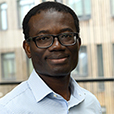
Discover York





